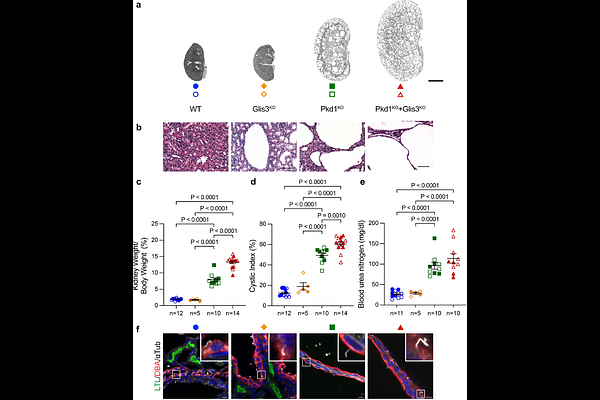Glis3 is a modifier of cyst progression in autosomal dominant polycystic kidney disease

Glis3 is a modifier of cyst progression in autosomal dominant polycystic kidney disease
Wei, Z.; Gu, J.; Tian, X.; Zhang, C.; Zhao, H.; Somlo, S.
AbstractBackground: Autosomal dominant polycystic kidney disease (ADPKD) is caused by mutations affecting polycystin-1 (PC1) or -2 (PC2). The existence of a cilia-dependent cyst activation (CDCA) pathway has been identified by demonstrating that structurally intact primary cilia are crucial for cyst growth following loss of polycystins. We previously used translating ribosome affinity purification (TRAP) RNA-Seq on pre-cystic mouse kidneys to determine the translatome that meet the criteria for CDCA and identified Glis2 as an early effector of polycystin signaling. Here, we investigate the potential role of Glis3 in ADPKD, which, while not transcriptionally altered, encodes a cilia-localized transcription factor belonging to the same family of genes as Glis2. Methods: We used live cell confocal imaging to study the subcellular localization of Glis3 in the presence or absence of Pkd1. We used Glis3 conditional knockout mice to investigate the genetic interaction between Glis3 and Pkd1. Changes in gene expression and chromatin accessibility were assessed by RNA-Seq and ATAC-Seq on an allelic series of Glis3 and Pkd1 kidney selective inactivation models at 7-weeks age to evaluate the function of Glis3. Results: The ciliary localization of Glis3 is not affected by Pkd1 mutation status. Kidney selective Glis3 by itself does not affect kidney structure or function, but dual inactivation of Glis3 and Pkd1 significantly worsen polycystic kidney disease. Integration of transcriptomic profiling and chromatin accessibility assays suggested that kidney tubule specific Glis3 inactivation results in dysregulated fatty acid metabolism and circadian. Conclusions: Glis3 is a primary cilium localized transcription factor that genetically interacts with Pkd1 and modifies kidney epithelial cell metabolism and circadian function.